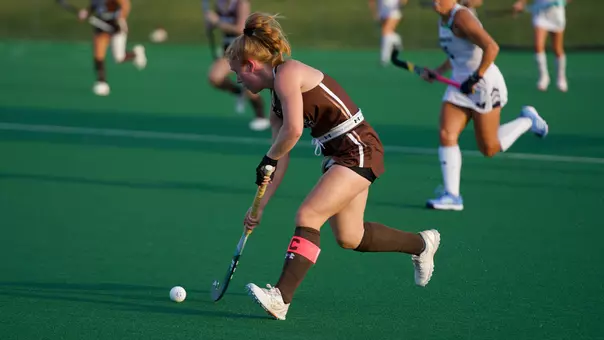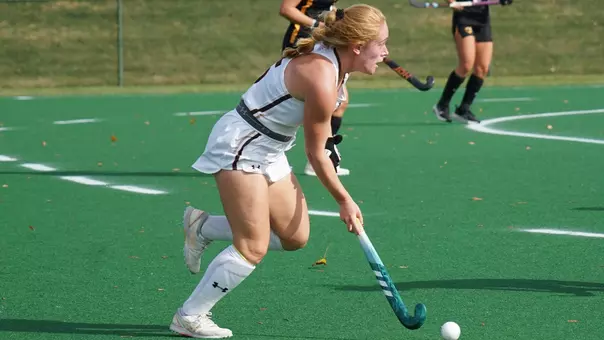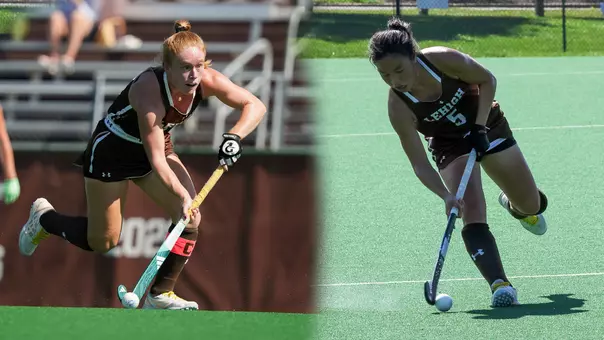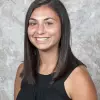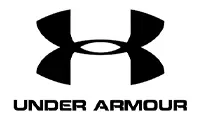Lehigh University Athletics
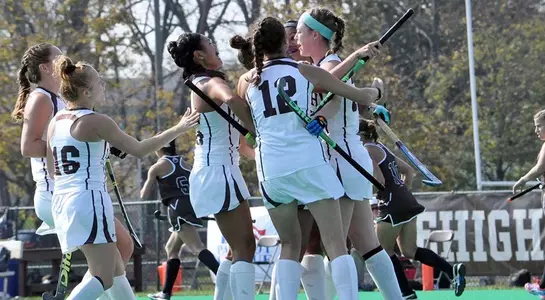
Creating the foundation
12/6/2016 11:03:00 AM | Field Hockey, Student Athlete, Features
By: Justin Lafleur, Lehigh Sports Communications
As a new coach looking to build a successful program, a foundation gives everyone the building blocks to succeed.
The 2016 Lehigh field hockey season featured its fair share of ups and downs, but the end result was a year marked by impressive, important and necessary strides.
"As a staff, we really wanted to focus on progress, and I think our statistics showed just that," said head coach Caitlin Dallmeyer, who started at Lehigh last spring. "We were happy to see the team grasp onto new philosophies and work hard to implement them in our first year."
Creating the Foundation
Before jumping into X's and O's of field hockey, Dallmeyer focused on putting her student-athletes in the best positions to succeed. One of the starting points for her staff was making sure the entire team was bought into defense.

"Throughout preseason, defense was one of the things we harped on most," said Dallmeyer. "You need to make sure you give yourself a chance by being sound defensively, making sure you can make a tackle and you can stop some of the great players we face."
Looking back at year one under Dallmeyer, the results are evident, especially on the defensive end of the field. Lehigh allowed its fewest goals since 2004, fewest shots since 2007 and fewest shots on goal in at least the last 12 years. The Mountain Hawks shut-out consecutive Patriot League opponents for the first time in school history, topping Holy Cross (1-0) and Colgate (6-0). Lehigh also won its most home games since 2004, allowing a total of six goals over those six wins.
The focus on defense was concerted and intentional. There was a significant adjustment period from the start.
"When Coach came in during the spring and started focusing on defense, I personally had to adjust a lot," said senior forward Gabby Tofig. "I was mainly a person who jabbed and didn't block tackle, which was something Coach really harped on. I struggled a lot with the transition, but by the end of the season, you could see how much it changed the forward line's game dramatically. Our press and 1v1 defense improved completely because of the defensive focus, and we were able to cause a lot of turnovers and transition to offense quickly because of it."
Along with defense, another foundational focus was watching film and understanding the game at a deeper level. That understanding could help a player be in the right position on game day, helping put everyone in the best position to succeed.
"We spent a lot of time showing our team what our opponents would look like on the field, along with their strengths and weaknesses as a team," said Dallmeyer. "That preparation helped our team gain confidence going into each game."
Perhaps more important than watching film of opponents was watching film to improve oneself.
"We focused on our structure and strategy," said Dallmeyer. "We watched a lot of film individually. The players were able to come in and talk through film with us as a staff."

The coaches' willingness to help motivated the student-athletes to put in that much more work.
"Our coaches really changed how we saw ourselves on the field," said Tofig. "Film doesn't lie, and it was really crucial in helping us see our weaknesses and what we needed to improve for the upcoming week. Our coaches were always willing to go through the film and ask how they could help us fix any problems we had during that week of practice leading up to the next game."
Dallmeyer began to see dividends of the extra film work. The team began to display its new-found knowledge in a number of different situations.
"We were really happy with the increase in hockey IQ," she said. "During difficult games, opponents were constantly adjusting for us. We were able to get ahead of our game plan because we had people on the sidelines who were playing closer attention to what was happening, and we were being more proactive in our game structure.
"We started to see that hockey IQ develop," Dallmeyer continued. "By the end, we had players on our sidelines who were thinking as strategically as the coaching staff."
The Season
The season itself began in grand fashion, a 2-1 win over a perennially strong Rider program, marking the Mountain Hawks' first win over the Broncs since 2007.

Lehigh then lost eight straight games, but the team's mindset allowed it to stay focused on the goals at hand. Amidst a challenging schedule, the team stayed positive.
The Mountain Hawks were seeing progress. One example was a competitive 2-0 loss at Penn, facing a Quakers' team coming off a 13-3 season.
"We talked a lot about finding success in the process and in setting small goals for ourselves," said Dallmeyer. "We celebrated those small goals and successes. In just closing down the margin against those teams, we choose to celebrate the progress our student-athletes were able to execute on the field."
"The little victories were some of our motivators during the tough stretches," said junior defender Laura Yuh. "They helped us remember the good things we were capable of. The team also did a good job learning from the losses and figuring out what needed to be improved upon for the next game."
The Mountain Hawks learned from some tough experiences, which helped lead to victories. The highlight was a four-game winning streak, the program's longest winning streak since 1986. The streak began with a hard-fought 1-0 shutout over Holy Cross, a team that went on to beat Bucknell and Lafayette, and earn the No. 3 seed in the Patriot League Tournament.
Lehigh continued the success beyond that streak, playing an extremely competitive first half at nationally-ranked Boston University. The game was scoreless until the Terriers broke the deadlock in the final seconds of the first half. Despite the loss, takeaways from that the game could pay significant dividends in the big picture.
"It was nice to see us play a top 20 team to a really high level in the midfield and prove to ourselves that we can compete at that speed, that level and that physicality," said Dallmeyer "We showed we could hold our own, come up with scoring opportunities and prevent a lot of shots on goal because of our defensive structure."
Two weekends later, Lehigh played at Lafayette with a chance to earn the program's first Patriot League Tournament berth since 2011. One of the team's best performances of the season saw the Mountain Hawks score first (with just 12:29 remaining in the game) and allow just two shots on goal for the game, but the Leopards came back for a 2-1 win.
Perhaps the most telling sign of the student-athletes' character, and the positive culture developing in the Lehigh program, is the way the team bounced back less than 48 hours later. The Mountain Hawks went on to beat Brown, taking a 3-1 lead before winning, 4-2.
"Brown is consistently a really strong team," said Dallmeyer. "I felt like we handled them well and we were able to stick to our game plan the whole time, which was the first time we were able to execute all of our pieces for a 70-minute time period."

"Against Lafayette, we were pleased with the high level of play we maintained throughout the entire game, but we knew we didn't want the same outcome against Brown," said Yuh. "We knew wanted to send the seniors off on a high note and set the tone for our offseason. It really reflects upon the team's resilience and ability to learn from the losses rather than dwell on them."
Defense was the team's focus, but the offense developed nicely as the season progressed. The Mountain Hawks went through some scoring droughts, but also scored six goals vs. Colgate (their most-ever goals in a Patriot League game) followed by five against Towson. Lehigh finished the year averaging 1.65 goals per game, an impressive figure considering it had just four over its first eight games. The Mountain Hawks averaged 2.18 goals over their final 11 contests.
"One of the bigger adjustments this year was for the attack because of the bigger emphasis on defending, operating several different presses and making sure to play as a unit," said Dallmeyer. "It was an adjustment in philosophy from previous years, so it was really hard for some of our seniors to grasp onto that mentality. It took a while to get our forwards flowing consistently, understanding the structure and how it should be implemented into game play. When things connected and they were working as a unit, it was nice to see what the forward line was capable of doing."
Statistics showed strong progress this season, but even more important than tangible statistics was intangible improvements, signs of a strong culture which should lead to continued success.
"We saw student-athletes taking accountability for our play, and how our actions affect the entire team," said Dallmeyer. "We saw that with players coming out before practice, or staying after, to make sure they were getting touches on the ball - to build their own confidence and to make sure they were doing what they needed in order for the team to be successful."
Looking Ahead
The program is in a strong position to continue its improvement. As currently constituted, the team was just minutes from clinching a postseason berth, but there is a lot more potential for improvement within Lehigh field hockey.
The next challenge for the program is the upcoming spring campaign.
"Our players know we have a pretty tough spring season ahead of us, a season of individual improvement and making sure we're setting ourselves up for success," said Dallmeyer. "I think they're excited and nervous. They haven't had a full spring with our coaching staff yet, so it will be interesting to see how they react to a lot of the team-building work that we're going to do, along with strength and conditioning and speed training as well."

"The coaches' philosophies and styles are pushing us to constantly work towards bettering ourselves as players, and as a team," said Yuh. "I'm looking forward to improving this spring and fine-tuning all the little details we need to fix, on and off the field. Next fall will be another opportunity for us to show other teams how hard we've worked."
The seniors were model examples with the coaching change, showing a real willingness to lead. Now it's up to the returnees to take the reins and help the program take the next step.
"The seniors were really eager to embrace new philosophies," said Dallmeyer. "They helped lay a groundwork for this team to make an easy transition. We hope we can carry on a lot of the positivity and flexibility they left us with."
Playing sports, it's easy to only focus on instant gratification, but it's safe to say Lehigh field hockey has a big-picture approach.
"In the beginning of the season we came so close in many games, but we were just unable to win those games," said Tofig. "However, every game we saw improvements and that's what kept us going. The team's ability to remain focus and accept all of the changes during the season was because of great leadership by the leadership council and coaches."
"Rome wasn't built in a day and it's not going to happen overnight," said Dallmeyer. "Ending on a really high note and seeing so much progress this year makes us really hopeful for what we'll be able to continue to accomplish, now that we have players who are thinking more strategically and putting in more time to improving themselves and the team."
The players know they're part of something bigger than themselves, and will stay invested in the program's success well beyond graduation.
"I am so excited for this team," said Tofig. "Everyone wants to improve and help the team succeed, and they're all putting in the work. I know they will do great things and I can't wait to see what they accomplish."

As a new coach looking to build a successful program, a foundation gives everyone the building blocks to succeed.
The 2016 Lehigh field hockey season featured its fair share of ups and downs, but the end result was a year marked by impressive, important and necessary strides.
"As a staff, we really wanted to focus on progress, and I think our statistics showed just that," said head coach Caitlin Dallmeyer, who started at Lehigh last spring. "We were happy to see the team grasp onto new philosophies and work hard to implement them in our first year."
Creating the Foundation
Before jumping into X's and O's of field hockey, Dallmeyer focused on putting her student-athletes in the best positions to succeed. One of the starting points for her staff was making sure the entire team was bought into defense.

"Throughout preseason, defense was one of the things we harped on most," said Dallmeyer. "You need to make sure you give yourself a chance by being sound defensively, making sure you can make a tackle and you can stop some of the great players we face."
Looking back at year one under Dallmeyer, the results are evident, especially on the defensive end of the field. Lehigh allowed its fewest goals since 2004, fewest shots since 2007 and fewest shots on goal in at least the last 12 years. The Mountain Hawks shut-out consecutive Patriot League opponents for the first time in school history, topping Holy Cross (1-0) and Colgate (6-0). Lehigh also won its most home games since 2004, allowing a total of six goals over those six wins.
The focus on defense was concerted and intentional. There was a significant adjustment period from the start.
"When Coach came in during the spring and started focusing on defense, I personally had to adjust a lot," said senior forward Gabby Tofig. "I was mainly a person who jabbed and didn't block tackle, which was something Coach really harped on. I struggled a lot with the transition, but by the end of the season, you could see how much it changed the forward line's game dramatically. Our press and 1v1 defense improved completely because of the defensive focus, and we were able to cause a lot of turnovers and transition to offense quickly because of it."
Along with defense, another foundational focus was watching film and understanding the game at a deeper level. That understanding could help a player be in the right position on game day, helping put everyone in the best position to succeed.
"We spent a lot of time showing our team what our opponents would look like on the field, along with their strengths and weaknesses as a team," said Dallmeyer. "That preparation helped our team gain confidence going into each game."
Perhaps more important than watching film of opponents was watching film to improve oneself.
"We focused on our structure and strategy," said Dallmeyer. "We watched a lot of film individually. The players were able to come in and talk through film with us as a staff."

The coaches' willingness to help motivated the student-athletes to put in that much more work.
"Our coaches really changed how we saw ourselves on the field," said Tofig. "Film doesn't lie, and it was really crucial in helping us see our weaknesses and what we needed to improve for the upcoming week. Our coaches were always willing to go through the film and ask how they could help us fix any problems we had during that week of practice leading up to the next game."
Dallmeyer began to see dividends of the extra film work. The team began to display its new-found knowledge in a number of different situations.
"We were really happy with the increase in hockey IQ," she said. "During difficult games, opponents were constantly adjusting for us. We were able to get ahead of our game plan because we had people on the sidelines who were playing closer attention to what was happening, and we were being more proactive in our game structure.
"We started to see that hockey IQ develop," Dallmeyer continued. "By the end, we had players on our sidelines who were thinking as strategically as the coaching staff."
The Season
The season itself began in grand fashion, a 2-1 win over a perennially strong Rider program, marking the Mountain Hawks' first win over the Broncs since 2007.

Lehigh then lost eight straight games, but the team's mindset allowed it to stay focused on the goals at hand. Amidst a challenging schedule, the team stayed positive.
The Mountain Hawks were seeing progress. One example was a competitive 2-0 loss at Penn, facing a Quakers' team coming off a 13-3 season.
"We talked a lot about finding success in the process and in setting small goals for ourselves," said Dallmeyer. "We celebrated those small goals and successes. In just closing down the margin against those teams, we choose to celebrate the progress our student-athletes were able to execute on the field."
"The little victories were some of our motivators during the tough stretches," said junior defender Laura Yuh. "They helped us remember the good things we were capable of. The team also did a good job learning from the losses and figuring out what needed to be improved upon for the next game."
The Mountain Hawks learned from some tough experiences, which helped lead to victories. The highlight was a four-game winning streak, the program's longest winning streak since 1986. The streak began with a hard-fought 1-0 shutout over Holy Cross, a team that went on to beat Bucknell and Lafayette, and earn the No. 3 seed in the Patriot League Tournament.
Lehigh continued the success beyond that streak, playing an extremely competitive first half at nationally-ranked Boston University. The game was scoreless until the Terriers broke the deadlock in the final seconds of the first half. Despite the loss, takeaways from that the game could pay significant dividends in the big picture.
"It was nice to see us play a top 20 team to a really high level in the midfield and prove to ourselves that we can compete at that speed, that level and that physicality," said Dallmeyer "We showed we could hold our own, come up with scoring opportunities and prevent a lot of shots on goal because of our defensive structure."
Two weekends later, Lehigh played at Lafayette with a chance to earn the program's first Patriot League Tournament berth since 2011. One of the team's best performances of the season saw the Mountain Hawks score first (with just 12:29 remaining in the game) and allow just two shots on goal for the game, but the Leopards came back for a 2-1 win.
Perhaps the most telling sign of the student-athletes' character, and the positive culture developing in the Lehigh program, is the way the team bounced back less than 48 hours later. The Mountain Hawks went on to beat Brown, taking a 3-1 lead before winning, 4-2.
"Brown is consistently a really strong team," said Dallmeyer. "I felt like we handled them well and we were able to stick to our game plan the whole time, which was the first time we were able to execute all of our pieces for a 70-minute time period."

"Against Lafayette, we were pleased with the high level of play we maintained throughout the entire game, but we knew we didn't want the same outcome against Brown," said Yuh. "We knew wanted to send the seniors off on a high note and set the tone for our offseason. It really reflects upon the team's resilience and ability to learn from the losses rather than dwell on them."
Defense was the team's focus, but the offense developed nicely as the season progressed. The Mountain Hawks went through some scoring droughts, but also scored six goals vs. Colgate (their most-ever goals in a Patriot League game) followed by five against Towson. Lehigh finished the year averaging 1.65 goals per game, an impressive figure considering it had just four over its first eight games. The Mountain Hawks averaged 2.18 goals over their final 11 contests.
"One of the bigger adjustments this year was for the attack because of the bigger emphasis on defending, operating several different presses and making sure to play as a unit," said Dallmeyer. "It was an adjustment in philosophy from previous years, so it was really hard for some of our seniors to grasp onto that mentality. It took a while to get our forwards flowing consistently, understanding the structure and how it should be implemented into game play. When things connected and they were working as a unit, it was nice to see what the forward line was capable of doing."
Statistics showed strong progress this season, but even more important than tangible statistics was intangible improvements, signs of a strong culture which should lead to continued success.
"We saw student-athletes taking accountability for our play, and how our actions affect the entire team," said Dallmeyer. "We saw that with players coming out before practice, or staying after, to make sure they were getting touches on the ball - to build their own confidence and to make sure they were doing what they needed in order for the team to be successful."
Looking Ahead
The program is in a strong position to continue its improvement. As currently constituted, the team was just minutes from clinching a postseason berth, but there is a lot more potential for improvement within Lehigh field hockey.
The next challenge for the program is the upcoming spring campaign.
"Our players know we have a pretty tough spring season ahead of us, a season of individual improvement and making sure we're setting ourselves up for success," said Dallmeyer. "I think they're excited and nervous. They haven't had a full spring with our coaching staff yet, so it will be interesting to see how they react to a lot of the team-building work that we're going to do, along with strength and conditioning and speed training as well."

"The coaches' philosophies and styles are pushing us to constantly work towards bettering ourselves as players, and as a team," said Yuh. "I'm looking forward to improving this spring and fine-tuning all the little details we need to fix, on and off the field. Next fall will be another opportunity for us to show other teams how hard we've worked."
The seniors were model examples with the coaching change, showing a real willingness to lead. Now it's up to the returnees to take the reins and help the program take the next step.
"The seniors were really eager to embrace new philosophies," said Dallmeyer. "They helped lay a groundwork for this team to make an easy transition. We hope we can carry on a lot of the positivity and flexibility they left us with."
Playing sports, it's easy to only focus on instant gratification, but it's safe to say Lehigh field hockey has a big-picture approach.
"In the beginning of the season we came so close in many games, but we were just unable to win those games," said Tofig. "However, every game we saw improvements and that's what kept us going. The team's ability to remain focus and accept all of the changes during the season was because of great leadership by the leadership council and coaches."
"Rome wasn't built in a day and it's not going to happen overnight," said Dallmeyer. "Ending on a really high note and seeing so much progress this year makes us really hopeful for what we'll be able to continue to accomplish, now that we have players who are thinking more strategically and putting in more time to improving themselves and the team."
The players know they're part of something bigger than themselves, and will stay invested in the program's success well beyond graduation.
"I am so excited for this team," said Tofig. "Everyone wants to improve and help the team succeed, and they're all putting in the work. I know they will do great things and I can't wait to see what they accomplish."

Players Mentioned
Playing for something bigger than the game
Thursday, October 23
MHT EP3 - Field Hockey
Thursday, October 16
Field Hockey vs. Boston U.
Saturday, October 04
Field Hockey vs. LIU
Sunday, September 28

